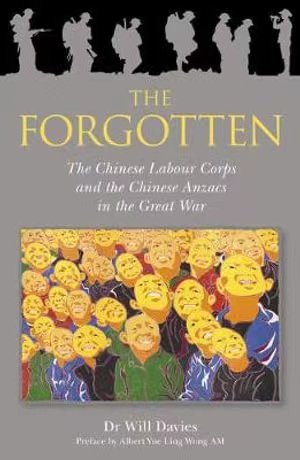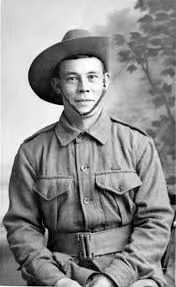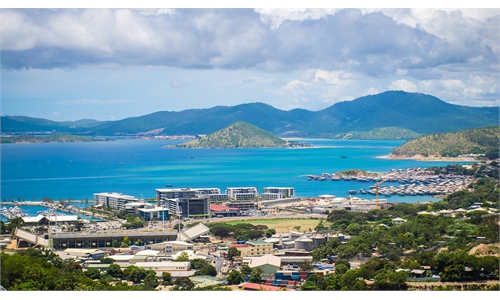Australians should review history of Chinese contribution to Australia in WWI amid today's toxic racial prejudices and abuses

Photo: booktopia.com
About 220 men of Chinese heritage enlisted themselves into the Australian Imperial Forces (AIF) to fight battles and campaigns in Europe during the First World War between 1914 and 1918. Among them, 65 were killed in action, and 19 received awards and medals after the war for their bravery and their selfless dedication. In his historically informative book, The Forgotten, Australian historian Will Davies made the illuminating revelation of the long obscured historical facts of the untold Chinese contribution to Australia's war efforts in the "Great War," with their heroism, ingenuity and endurance.Australia in the early 1900s was perversely gripped with racist paranoia and obsessions. The White Australia policy was adopted, immediately after the country confederated into an independent sovereign state, to exclude immigrants from Asia, in particular from China. For those who had already been living and working in cities, townships, paddocks, and mines on the continent, they were categorically discriminated against, marginalized and abused. Early AIF recruitment criteria strictly precluded volunteers "not of substantial European origin or descent."
It was against this racially repressive and discriminatory context that the 200-odd servicemen of Chinese ethnicity joined the AIF to fight in Europe and the Middle East. Davies' book recounts incredible acts of gallantry by those who fought in the Gallipoli peninsula and the West Front. The legendary war hero Billy Sing was the most formidable sniper in the Australian and New Zealand Army Corp (ANZAC) for their Turkish opponents, causing "a very large number of casualties among the enemy, no risk being too great for him to take," according to the citation for the Distinguished Conduct Medal awarded to him.

Billy Sing, Australian soldier of Chinese and English descent who served in the Australian Imperial Force during World War I Photo: From The Forgotten
Another ANZAC soldier of Chinese descent, Leslie Langtip, captured an enemy field gun under heavy fire, and drove back a convoy of enemies that attempted to retake the cannon. Davies describes an interesting episode which demonstrates Leslie's admirable sense of righteousness in which he was indignant at seeing an English colonel arrogantly berating and bullying Arab troops in Damascus. The young Chinese trooper couldn't put up with such racism and condescendence, and directly censured the English officer. When the Englishman chose to ignore him, Leslie stepped forward and "punched him on the nose." That officer, Colonel Thomas Edward Lawrence, was in fact also known as "Lawrence of Arabia," and the punch from a Chinese Australian soldier obviously taught him a good lesson of racial egalitarianism.The dedication of the Chinese immigrants in Australia is best exemplified in Mei Quong Tart, who sent his son Arthur Quong Tart to the war front. Mei Quong Tart was one of the most influential Chinese in Australia at the time, acting as China's Consul in Sydney. Another Chinese immigrant, David Tong, wrote a letter of permission to send to the battlefield his 18-year-old son, Royden Wesley Tong, who was twice wounded in Pozieres, France and then in Ypres, Belgium. In fact, in spite of the prevalent racism and discrimination in Australia at the time, the Chinese community rallied behind the nation's war efforts, contributing funds and welfare benefits, and encouraged members of the community to join the AIF. Their devotion and sacrifice had been instrumental to the making of the young country, forging its unique national characteristics.
Davies' book also describes grimly when the Chinese veterans returned to Australia at the end of the war, "they all faced a lack of work opportunities, educational opportunities and indifference to their service and sacrifice." He points out poignantly that "Men like Billy Sing, for all that he did, for his decorations and fame, there was little in Australia for this man on his return." Racism, as embodied in the pernicious White Australia policy, became even more rampant and "Australia was not a happy place for even long-established Chinese residents and for those who served" before multiculturalism was officially instated as the national policy in the 1970s.
In 1818, Mak Sai Ying arrived in Sydney as the first Chinese settler in Australia. Afterward, generations of Chinese Australians have struggled, survived and thrived in this Land of the South. They have contributed to Australia's nation building, social development and economic prosperity, also serving as an essential bridge between Australia, the country they now call home, and China, the country of their ancestry.
It is therefore very important for today's Australians to remember that racial prejudices and abuses are toxic to the sound development of the society. The Chinese and their Anglo-Saxon "mates" had fought shoulder to shoulder in war-time trenches, and today's multicultural Australia could not have flourished without the consistent and longstanding partnership of the two great countries and their peoples.
Peace and prosperity can only happen and continue as long as we do not forget our shared past. "Lest We Forget."
The author is a professor and director of the Australian Studies Centre, East China Normal University. This article is a review of the book, The Forgotten, authored by Will Davies and published in 2020 by Wilkinson Publishing in Australia. opinion@globaltimes.com.cn


